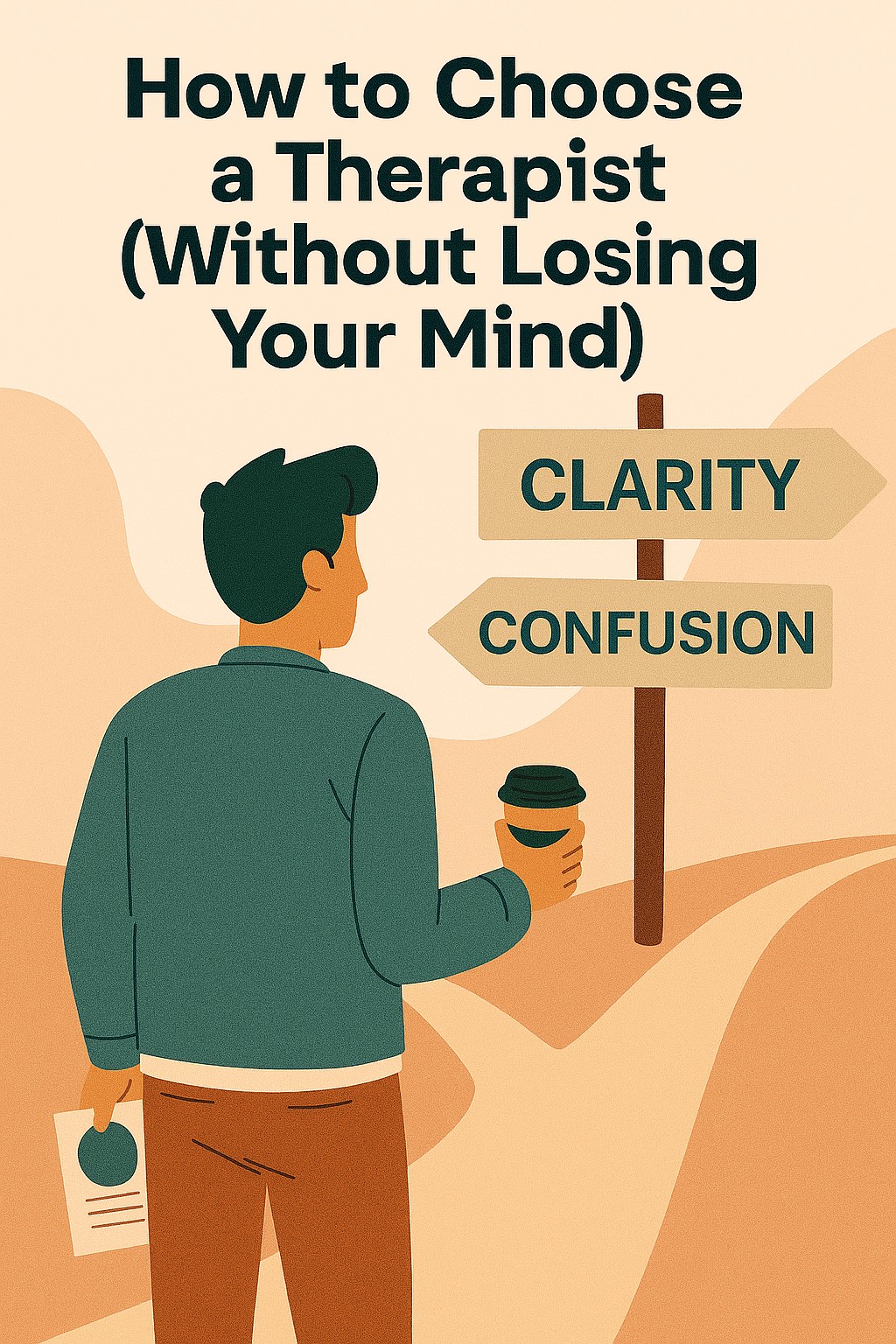
Finding the right mental health therapist—or counselor, if you’re playing the SEO game—is like dating, but with more crying and fewer awkward dinners. You want someone who gets you, challenges you, and doesn’t treat your trauma like a TED Talk topic.
But in today’s world of ideological static, TikTok therapy trends, and bios that sound like spiritual smoothies (“I help clients find their authentic selves through mindful embodiment”), you need more than a vibe check. You need a strategy.
Let’s cut through the noise and get real.
First, Understand What Therapy Isn’t
Here’s your first sanity-saving truth: clinical therapy is not activism. It’s not a political rally, a gender studies seminar, or a place to debate cultural theory. It’s a space for you—your anxiety, your trauma, your relationships, your healing.
If you’re looking for someone to help you unpack grief, not indoctrinate you into a worldview, ask upfront:
- “Do you focus on clinical mental health, or do you integrate social or ideological frameworks?”
- “Do you bring politics or sexual ideology into sessions?”
- “How do you handle clients with diverse beliefs?”
If they flinch, deflect, or start quoting TikTok therapists who say “trauma is a colonial construct,” run. Therapy should be about you, not their agenda.
Step 1: Know Thyself (Or at Least Pretend To)
Before you start therapist-hunting like it’s Black Friday at the emotional outlet mall, ask yourself:
- Do I want someone who listens quietly or calls me out like Judge Judy?
- Am I dealing with anxiety, trauma, relationship drama, or just existential dread with a side of sarcasm?
- Do I want faith-based counseling, cognitive behavioral therapy, EMDR, or someone who just nods and hands me tissues?
Knowing your goals helps you filter out the counselors who are lovely but not your flavor of healing.
Step 2: Credentials Matter (But So Does Vibe)
Yes, your therapist should be licensed. No, they don’t need a PhD in “Feelings and Stuff.” Look for:
- LMHC, LCSW, LPC, PsyD, or other alphabet soup that means they didn’t get their degree from a cereal box.
- Experience with your specific issue. If you’re dealing with grief, don’t settle for someone who specializes in workplace burnout and thinks “closure” is a myth.
- Bonus points if they have testimonials that don’t sound like they were written by ChatGPT’s cousin.
But here’s the kicker: credentials don’t guarantee chemistry. You need someone whose energy matches yours. If you’re sarcastic, a super-serious counselor might feel like emotional jail. If you’re sensitive, a tough-love therapist might feel like boot camp for your soul.
Step 3: Stalk Strategically
Google them. Read their bios. Watch their intro videos if available. If they say “I help clients find their authentic selves through mindful exploration,” and you’re more of a “I just want to stop crying in the Trader Joe’s parking lot” type—keep scrolling.
Check platforms like Psychology Today, TherapyDen, or even TikTok (yes, some therapists are out there dropping truth bombs between dance trends).
Step 4: Ask the Awkward Questions
When you book that first consult (usually free or low-cost), don’t be shy. Ask:
- What’s your approach to therapy?
- How do you handle clients who resist change?
- What’s your stance on medication, spirituality, or trauma-informed care?
If they flinch at your questions, imagine how they’ll react when you bring up your ex, your mom, or your fear of dying alone surrounded by cats.
Step 5: Try Before You Cry
The first few sessions are like test-driving a car. You’re checking for comfort, responsiveness, and whether they make weird noises when you talk about your childhood.
If you feel judged, dismissed, or like you’re performing emotional karaoke—run. The right therapist or counselor should make you feel safe, seen, and slightly uncomfortable in a good way (growth hurts, remember?).
What If It’s for a Child or Teen?
Children and teens aren’t mini-adults. They need counselors who speak fluent Minecraft, Snapchat, and awkward silence. Look for:
- Play therapy or art therapy credentials for younger kids.
- Experience with school systems, bullying, or neurodivergence.
- Someone who doesn’t treat your teen like a broken iPhone that just needs a reboot.
And ask: “Do you work with parents as part of the process?” Because if they treat you like the enemy, it’s not therapy—it’s a hostage negotiation.
Marriage and Relationship Counseling
Couples therapy is not about proving who’s right. It’s about learning how to fight without turning your kitchen into a courtroom.
Look for:
- Emotionally focused therapy (EFT) or Gottman Method training.
- A counselor who doesn’t take sides but does call out toxic patterns.
- Someone who understands cultural, spiritual, or gender dynamics without turning your marriage into a sociology experiment.
And yes, ask: “Do you integrate political or ideological frameworks into couples work?” Because if your therapist is more interested in dismantling the patriarchy than helping you stop passive-aggressive texting, you’ve got a problem.
Group Counseling: Choose Your Circle Wisely
Group therapy can be powerful—or it can feel like a bad episode of The View. You want:
- A skilled facilitator who sets boundaries and keeps the group focused.
- Clear goals: Is this trauma recovery, addiction support, or just a venting circle?
- A group that shares your values, or at least respects them.
Ask: “How do you manage ideological conflict in group settings?” Because nothing derails healing faster than a debate over pronouns when you came to talk about grief.
Final Thoughts: Therapy Is About You, Not Their Agenda
Choosing a mental health therapist or counselor is about finding someone who listens, challenges, and respects your worldview. You don’t need a guru. You need a guide.
So ask the awkward questions. Trust your gut. And remember: healing is hard enough without ideological static in the background.
